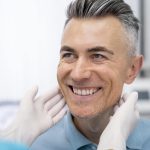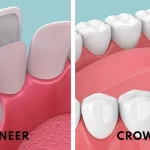Blog
Millions of Australians live with a disability, but dental care remains out of reach for many
Cameron Bloomfield hasn’t had a routine dental check-up since he was in primary school.
“I’ve only seen dentists when I had a toothache. I’ve never had a regular dentist, like you have a regular doctor,” the 37-year-old says.
“It’s too expensive, having an intellectual disability and being on the disability pension.”
Accessing dental care has always been a battle involving lengthy public dental waitlists and, at times, desperate calls to his contacts in the
disability sector.
As an adult, Mr Bloomfield has only seen a dentist a handful of times — always in emergencies — and most often those visits ended with the removal of the
troublesome tooth.
“I have lost a few teeth in my adult life,” Mr Bloomfield says.
“I’d go in and see the dentist and they’ll just pull the tooth out. It’s all that they’ll ever really do, they wouldn’t do anything else.”
Apart from learning to brush his teeth from his parents, Mr Bloomfield has never been taught about oral health or supported to maintain it, even
while living in a group home.
‘Hidden’ suffering as people with disabilities wait years for treatment
Despite experiencing greater levels of oral disease, many Australians with disabilities struggle to access dental healthcare.
In a 2018 Australian Bureau of Statistics survey, almost a third of people with disabilities reported delaying or skipping a dentist visit due to
cost.
“It’s easy going to the doctors … it’s different going to a dentist where you could be out of pocket $300 in one session,” Mr Bloomfield says.
As a self-advocate and trainer who works with other people with intellectual disabilities, he knows he is not alone in his struggle for
oral healthcare.
“I know one guy who had to get all his teeth taken out. I met him when it was already too late … they took him to the dental hospital for an
operation,” Mr Bloomfield says.
These stories don’t surprise Mathew Lim, a special needs dentistry consultant, lecturer and researcher at the University of Melbourne’s
dental school.
Dr Lim treats patients with disabilities in his work in the private and public system, including at several Melbourne hospitals.
“We see people who the system seems to be failing,” Dr Lim says.
“They struggle to get the care they need, they’re completely lost and often come into a crisis situation.”
Many people like Mr Bloomfield have no choice but to rely on the public system, sometimes waiting years while being shuffled across various
public waitlists.
“For some … if you look back through their records, they’ve been waiting up to 10 years to be able to have that treatment,” he says.
The barriers are particularly high for people with intellectual disabilities or complex needs who require specialist care.
“They go to see a dentist in the community first, then need to be referred to a specialist and often after they’ve waited on that extended waitlist …
they need to wait on another,” Dr Lim says.
When those patients eventually reach Dr Lim, they need on average 10 to 15 teeth removed, an outcome that in itself creates severe disability.
“It really just demonstrates the severity of the oral health disease that’s there … and it’s essentially entirely preventable,” he says.
Yet the state of oral health among people with disabilities in Australia is largely unknown due to a lack of data.
“The metrics we use … [are] targeted towards people who can answer a telephone, answer a survey, and then go to a conventional dentist to
have a check-up,” says Dr Lim.
“And that forms the basis of our population data … so many people with disabilities are hidden.”
An unpopular specialty and an under-served population
While more than four million Australians live with a disability, there are just 25 special-needs specialists nationwide to care for their oral
health.
While many could be treated by a general dentist, they can struggle to find one happy to treat them, rather than referring them to a specialist.
About a third of general dentists are unwilling to treat people with disabilities, mostly due to a lack of confidence and training in how to
treat patients with special needs, Dr Lim says.
“They don’t want to do anything that’s going to cause any harm,” he says.
Many feel overwhelmed and ill-equipped when it comes to managing patients with complex health, communication and behavioural issues.
Oral health is central to general health and wellbeing
It’s not just a cosmetic issue — Dr Lim says Australia sees a number of “significant hospitalisations” due to poor oral health, which is
associated with heart and lung disease, diabetes, stroke and aspiration pneumonia.
“It’s not unusual to see someone with a disability come in with a dental problem that has exacerbated to the point where … it actually presents a life-threatening
condition,” he says.
Maintaining good oral health is critically important for Melbourne woman Kiah Haysom.
Born with spastic quadriplegic cerebral palsy which affects her motor control, Ms Haysom communicates with an eye-gaze communication system
and is fed via a feeding tube.
The 19-year-old is at a high risk of aspiration pneumonia, which already put her in hospital as a child and is a leading cause of premature death for people with disability in Australia.
“Because she’s not chewing on food and using her mouth in the same way an average person might … her needs are a bit more complex,” her mother
Shelley Haysom-Brown says.
Ms Haysom requires most dental treatment to be completed by a specialist under a general anaesthetic.
As a child, she was lucky to receive that care at Melbourne’s Royal Children’s Hospital.
Ms Haysom enjoyed going to a familiar and fun place where there were animals and dancing, but since transitioning into adult services in
2021, she is yet to find a dental practitioner.
“[Being forced to get] a different dentist isn’t fair”, Ms Haysom says through her communication system.
While Ms Haysom was referred to adult services for her other health needs, when it came to dental care, the family was advised against even trying
to get into the public system.
“The transition nurse made it quite clear the dental hospital had a really large waiting list. It was many years, we were told there was just about
no point” Ms Haysom-Brown says.
“I thought people like Kiah who have complex needs and need that extra support would get some sort of priority, but apparently not.”
Improving access to oral healthcare one person at a time
After decades seeing little progress with dental inequity, associate professor in special needs dentistry at University of Melbourne, Mina
Borromeo, has started charity OneOneTwelve to spark overdue change.
OneOneTwelve aims to build a more inclusive workforce by recruiting oral health practitioners and people with disabilities for a unique quid pro quo.
In exchange for taking on a person with a disability pro bono for a year, the dental practitioner will receive practical special needs dentistry
training, mentorship and support.
“It’s not just about the dentistry, it’s about the preparation before the patient comes, everything you do while the patient is in the chair and
everything you do afterwards,” Dr Borromeo says.
The training aims to give practitioners the skills and support, so they can treat people with disabilities with confidence.
“Sometimes you need to have a conversation with a speech pathologist, who might be managing the swallowing issues in your patient,” Dr Borromeo says.
“Even something as simple as wheelchair access, learning to manoeuvre a wheelchair in a small tight environment.”
Special needs consultant and Coburg Dental Group owner Jeffrey Kestenberg has signed up his entire staff to the program.
“I’m so passionate about treating these people because they just don’t have access,” Dr Kestenberg says.
The clinic’s newest recruit, associate dentist Imogen Bessel, is one of a couple of dozen practitioners who have signed up to the program so far.
The 2022 dentistry graduate says her undergraduate studies did include some training on treating patients with special needs, but not enough to
feel confident.
“We haven’t seen enough patients to know what to do,” Dr Bessel says.
“It’s a huge number of people that are just excluded from general dental clinics, so we need to learn how we can appropriately provide a high
quality of care for these patients.”
Dr Borromeo hopes the program will encourage more general practitioners to start treating patients with disabilities.
“It’s time consuming, you’re spending time advocating for your patients as much as you are treating them, but it’s incredibly rewarding,” she says.






